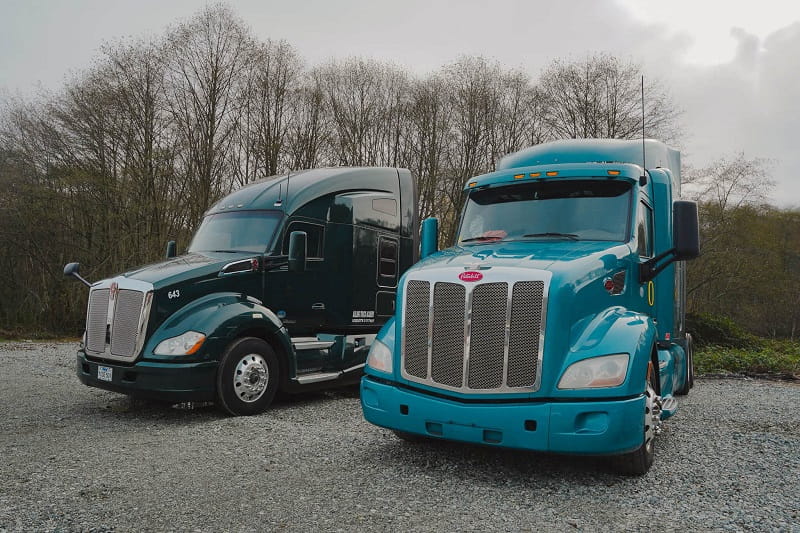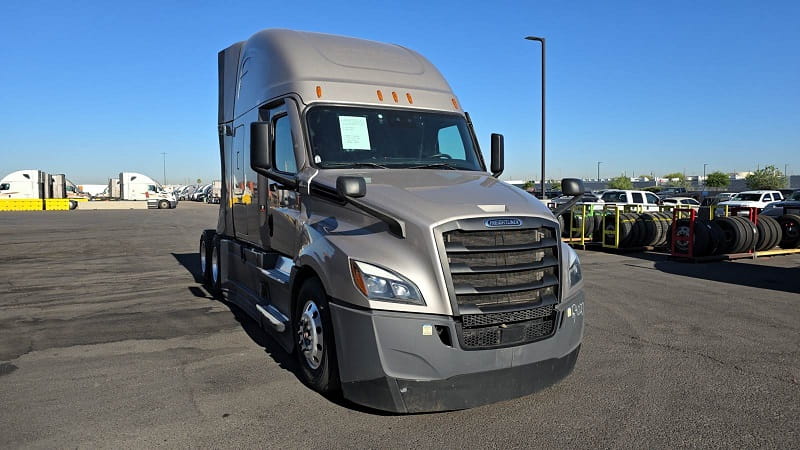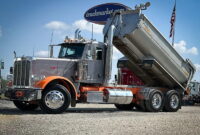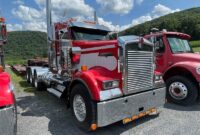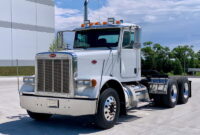Commercial Semi Truck for Sale catdumptruck.com | Commercial semi trucks are the backbone of freight transportation worldwide, enabling efficient movement of goods across cities, states, and countries.
Whether you operate a logistics company, freight business, or need a reliable tractor for your hauling needs, purchasing a commercial semi truck is a significant investment that requires careful consideration.
This comprehensive guide provides everything you need to know about buying a commercial semi truck in 2025—from types and features to pricing and buying tips. Plus, we include a detailed list of popular semi trucks on the market along with their price ranges.
Read More: Commercial Pickup Truck for Sale
Commercial Semi Truck for Sale
What is a Commercial Semi Truck?
A commercial semi truck, also called a tractor-trailer or big rig, is a heavy-duty vehicle designed to haul large trailers loaded with freight.
The tractor unit (the front cab) is detachable from the trailer, allowing flexibility in cargo transport. Semi trucks are engineered for long-distance travel, heavy payloads, and reliable performance under demanding conditions.
Commercial Semi Truck for Sale
Types of Commercial Semi Trucks
Day Cab Semi Trucks
These trucks feature a cab without a sleeping area, ideal for short-haul or regional deliveries.
Sleeper Cab Semi Trucks
Equipped with a sleeping compartment, perfect for long-haul drivers needing rest during extended trips.
Conventional Semi Trucks
Have a long nose and hood in front of the cab, offering better engine access and often more power.
Cab-Over-Engine (COE) Semi Trucks
Have the cab positioned above the engine; more compact but less common in the U.S.
Vocational Semi Trucks
Built for specialized applications like dump trucks, cement mixers, or flatbeds but still classified as semi trucks.
Commercial Semi Truck for Sale
Key Features to Look for in a Commercial Semi Truck
- Engine Performance: Diesel engines with high torque for hauling heavy loads. Popular engines include Cummins, Detroit Diesel, and PACCAR.
- Horsepower and Torque: Essential for fuel efficiency and pulling power. Most semi trucks range from 400 to 600+ HP.
- Transmission: Manual or automatic, with automated manual transmissions (AMT) growing in popularity.
- Fuel Efficiency: Critical due to high mileage. Newer models often have advanced aerodynamics and fuel-saving technologies.
- Safety Features: Include collision mitigation, lane departure warning, adaptive cruise control, and electronic stability control.
- Cab Comfort: Sleeping bunks, climate control, infotainment, and ergonomic seating for driver comfort.
- GVWR and Payload Capacity: Gross Vehicle Weight Rating indicates maximum allowable weight, influencing the load capacity.
- Connectivity: Modern trucks have telematics systems for tracking and diagnostics.
Popular Commercial Semi Trucks for Sale in 2025 with Price List

Model Engine Horsepower (HP) Sleeper/Day Cab Starting Price (USD)
Freightliner Cascadia Detroit DD15 Diesel 400 – 605 Both $130,000 – $160,000
Volvo VNL 760 Volvo D13 Engine 405 – 500 Both $140,000 – $170,000
Kenworth T680 PACCAR MX-13 Diesel 405 – 510 Both $135,000 – $165,000
Peterbilt 579 PACCAR MX-13 Diesel 405 – 510 Both $140,000 – $175,000
International LT Series MaxxForce/ Cummins 400 – 500 Both $120,000 – $150,000
Mack Anthem MP8 Diesel Engine 405 – 505 Both $140,000 – $165,000
Western Star 4900 Detroit DD15 Diesel 455 – 605 Both $140,000 – $180,000
Freightliner M2 112 (Vocational) Detroit DD5 Diesel 260 – 350 Day Cab $90,000 – $120,000
New vs. Used Commercial Semi Trucks
New Semi Trucks:
Pros: Warranty coverage, latest technology, custom configurations, better fuel efficiency, lower maintenance initially.
Cons: Higher upfront cost, depreciation in first few years.
Used Semi Trucks:
Pros: Lower purchase price, less depreciation, availability of older models.
Cons: Potential higher maintenance, limited warranty, uncertain history.
Commercial Semi Truck for Sale
Where to Buy Commercial Semi Trucks
- Authorized Dealerships: Brands like Freightliner, Volvo, Kenworth, and Peterbilt sell new and certified pre-owned semi trucks.
- Online Marketplaces: CommercialTruckTrader, TruckPaper, and eBay Motors provide extensive listings with filters by location, price, and specs.
- Auctions: Government and commercial fleet auctions can be a source of quality used trucks at competitive prices.
- Fleet Sales: Many logistics companies periodically sell off trucks from their fleet.
Financing and Leasing Options
Buying a semi truck often requires financing due to the high cost. Many dealerships offer flexible loans and leasing options tailored for commercial operators.
Leasing can reduce upfront costs but might have mileage restrictions. Evaluate your business needs carefully to choose the best option.
Maintenance and Operating Costs
Owning a commercial semi truck involves ongoing costs including:
- Fuel: Semi trucks consume significant diesel fuel. Fuel economy varies based on engine, load, and driving conditions.
- Maintenance: Regular servicing of engine, transmission, brakes, tires, and electronics.
- Insurance: Varies depending on coverage, truck value, and usage. Commercial truck insurance can cost several thousand dollars annually.
- Licensing and Permits: Includes CDL licensing for drivers, vehicle registration, and special permits for oversized or hazardous loads.
Tips for Buying a Commercial Semi Truck
- Assess Your Business Needs: Consider the typical haul distances, cargo weight, and frequency to select the appropriate truck size and type.
- Check Vehicle History: For used trucks, request maintenance records, accident history, and verify odometer readings.
- Inspect Thoroughly: Have a trusted mechanic inspect the engine, chassis, transmission, and cab systems.
- Evaluate Fuel Efficiency: This can save significant operating costs over time.
- Consider Warranty and Support: New trucks often come with manufacturer support; used trucks may require aftermarket warranties.
- Understand Regulations: Ensure the truck complies with emissions standards and transport regulations in your operating regions.
Conclusion
Buying a commercial semi truck is a pivotal step in scaling your transportation or logistics business. The variety of options available in 2025, from fuel-efficient new models to affordable used trucks, means you can find a vehicle tailored to your operational demands and budget.
Investing time in researching models, comparing features, and understanding pricing will pay off in reliability and cost-effectiveness. Use the detailed price list and insights in this guide to make an informed decision and drive your business forward with confidence.
- Tandem Dump Truck for Sale - December 22, 2025
- Kenworth Day Cab Truck for Sale - December 21, 2025
- Peterbilt Day Cab Truck for Sale - December 20, 2025

